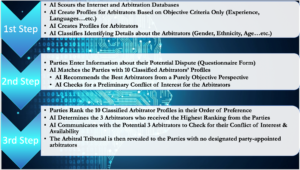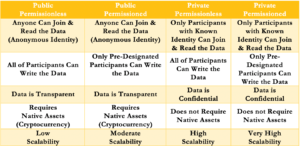Introduction:
Two of the most frequent buzz words in our world right now are without doubt: Blockchain & Artificial Intelligence (“AI”). Both technologies have definitely grabbed the attention of the international arbitration community, however, most of the current literature contemplates far-fetched scenarios and how these technologies can revolutionize the world of international arbitration. These articles definitely provide a snapshot of what the future of international arbitration might look like in 10 or 20 years. I would like to take a step back and see how these technologies can benefit the international arbitration community in the next 5 years. Further, no one has yet envisaged the potential impact of a marriage between both blockchain and AI in international arbitration. I would like to look also into the possibility of such a marriage and whether it can be considered as a match made in heaven.
(A) AI & International Arbitration:
Three Potential Imminent Benefits of AI in International Arbitration:
AI has undergone some recent outbreaks especially with respect to human language processing inspiring a whole array of legal tech solutions in the areas of legal research, access to justice, and predicting cases’ outcomes. In fact, some US courts already use AI-powered algorithms to assist the judges with setting bail-outs and sentencing decisions. As for international arbitration, most of the discussion has been centered around the possibility of having robotic arbitrators. Unfortunately, this discussion is more of an unknown unknown. The international arbitration community would be better off focusing its efforts upon the known knowns. AI has several use cases that are perfectly positioned to enhance international arbitration both in terms of efficiency as well as quality.
First, AI can review extremely long and detailed contracts and be able to recommend the most compatible arbitration agreement, and especially the most well-suited seat of arbitration and arbitral institution. This could be extremely helpful especially in transactions with tight deadlines as usually the arbitration clause is left till the end and hence dubbed as the “Midnight Clause.” For example, if the parties want to use a unilateral arbitration agreement, AI could direct them to choose London as the arbitral seat instead of Paris as the latter considers such an agreement as invalid.
Second, as the saying goes, arbitration is as good as the arbitrators. In this regard, AI can help the parties with choosing the best well-matched arbitrator for their disputes in terms of quality and availability. Further, in light of the ongoing discussion regarding party-appointed arbitrators and their inherent bias as was evidenced by a recent study, AI can help with the brand new methodology of appointment advocated by the CPR: the so-called screened appointment of arbitrators. In this regard, AI can help with the success of this new methodology through following these three steps:
Accordingly, AI will help achieving 4 main goals:
- Eliminate the Unconscious Bias of Party-Appointed Arbitrators;
- Diversify the Pool of Arbitrators in line with the Equal Representation in Arbitration Pledge;
- Reduce the Challenges to Arbitrators;
- Find the most Suitable & Available Arbitrator for the prospective dispute.
Third & Finally, AI can scrutinize arbitral award in a timely manner to maximize its chances of recognition and enforcement. For example, AI can ensure that the arbitral tribunal has complied with the procedural format required for the award. AI can also ascertain that the arbitral tribunal has answered every issue raised by the parties in their submissions. Additionally, AI can help the arbitrators with assessing the compliance of the award with mandatory rules and public policy of the seat of arbitration or potential places of enforcement of the award to comply with their duty to render an enforceable award. This can be done especially with respect to international public policy (i.e., Anti-Corruption International Regulations) as advocated recently by Sophie Nappert who asked an intriguing question: “What about drawing assistance from an algorithm programmed to recognise red flags in a given set of factual circumstances, and to determine the percentage chance of corruption being, or not being, present?”
(B) Blockchain & International Arbitration:
Private Permissioned Blockchain v. Public Permissionless Blockchain:
A blockchain can be defined as: “A database that stores digital information in a highly secure manner through (1) using cryptographic functions to encrypt such information and (2) distributing the database across a number of networks.” This definition tries to highlight the most important feature about blockchain; its extraordinary level of cybersecurity. Blockchain can be categorized in 4 types as follows:
Therefore, a private permissioned blockchain would be the optimal type of blockchains to be used in international arbitration for the following reasons:
- Private: To ensure the confidentiality that is usually highly regarded by participants in the arbitral process.
- Permissioned: To ensure that only pre-designated participants have control over the arbitral process (i.e., the arbitral institution before the constitution of the arbitral tribunal, and then the arbitral institution itself.)
Is there even a need for Blockchain in International Arbitration?
An arbitration practitioner has claimed in a recent Kluwer Arbitration Blog that: “there are cogent technological reasons which will make it difficult for the management of an arbitration reference to be conducted in a blockchain platform in the foreseeable future.” He relied upon an unsubstantiated claim that it is “quite slow and expensive to store massive volumes of data on a blockchain ledger.” The arbitration practitioner was relying in his assessment upon the low scalability of public permissionless blockchains such as bitcoin and did not take into consideration the very high scalable private permissioned blockchain that can allow for thousands of transactions per second at a very low cost. This article goes on – and rightly so – to advocate that cloud computing might not have “adequate security protocols which can prevent major cyberattacks in the future.” Then, the article advocates for the use of decentralized cloud storage systems and suggests that companies such as Storj, Sia and Filecoin are currently commercializing the use of such systems. This is quite ironic because if you are in the blockchain space, you would know that all three companies are in fact blockchain companies. In a way or another, a blockchain-sophisticated reader would see such an article as rather advocating for the use of blockchain in international arbitration. Therefore, blockchain (a private permissioned type) would be beneficial for international arbitration for the following reasons:1) For a full detailed account of the potential imminent benefits of blockchain for international arbitration, please see my forthcoming article “Three Potential Imminent Benefits of Blockchain for International Arbitration: Cybersecurity, Confidentiality and Efficiency” to be published in the next edition of Young Arbitration Review (YAR).
- Cybersecurity: Blockchain could potentially improve cybersecurity as it can impede fraudulent activities, and detect data tampering based on its underlying characteristics of immutability, data encryption and operational resilience.
- Confidentiality: Private permissioned blockchains could be compared to “organizations intranet pages, where information is only shared and exchanged internally with those who have been authorized to access the site.” Therefore, a private permissioned blockchain would provide international arbitration with an extremely confidential platform minimizing the risk of the leakage of sensitive data to any participant in the arbitral process.
- Efficiency: IBM signifies that smart contracts build on the blockchain might have the ability to reduce the time consumed in dispute resolution by 75%. Therefore, blockchain-based smart contracts might speed up the arbitral process to a great extent.
(C) Marriage of AI and Blockchain in International Arbitration: A Match made in Heaven between Confidentiality & Transparency?
Confidentiality and Transparency are usually seen as two opposites. However, with the marriage of AI and Blockchain, we can finally achieve both goals equally. As we already know, parties appreciate the fact that arbitration can provide a confidential platform for resolving their disputes.
In fact, 87% of respondents believe that confidentiality in international commercial arbitration is important. However, in international commercial arbitration, the lack of a transparent body of arbitral awards lessens the degree of legal certainty and predictability for both parties and makes life difficult for all participants in the arbitral process to have a reference point to which they can anchor their expectations. Further, the lack of transparency has left a dent to the legitimacy of international commercial arbitration which prompted many scholars to advocate for the publication of arbitral awards. As we have already pointed out, private permissioned blockchain promises a better platform for ensuring confidentiality of arbitral disputes. Accordingly, if we manage to train an AI software on spotting the identifying facts of arbitral awards (lets’ say investment arbitration awards as most of them are already publicly available), then we can have such AI software have an exclusive access to the body of arbitral awards on the private permissioned blockchain and then redact the identifying facts of such arbitral awards. Such a marriage will help us as an arbitration community achieve both virtues: Confidentiality and Transparency, which will reinforce the legitimacy of arbitration as a better platform for adjudicating disputes in the business community.
________________________
To make sure you do not miss out on regular updates from the Kluwer Arbitration Blog, please subscribe here. To submit a proposal for a blog post, please consult our Editorial Guidelines.

References
| ↑1 | For a full detailed account of the potential imminent benefits of blockchain for international arbitration, please see my forthcoming article “Three Potential Imminent Benefits of Blockchain for International Arbitration: Cybersecurity, Confidentiality and Efficiency” to be published in the next edition of Young Arbitration Review (YAR). |
|---|




Many thanks IMN Shehata for sharing this useful article by enlightening the future of this field of law.